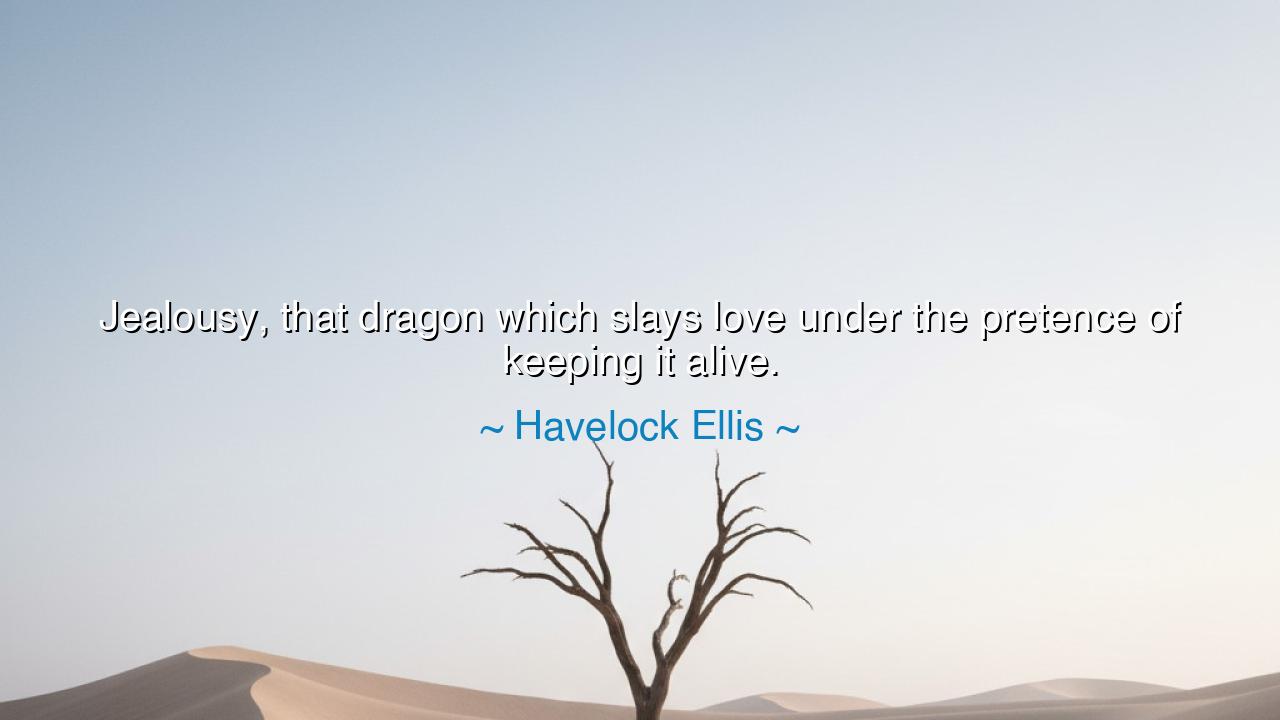
Jealousy, that dragon which slays love under the pretence of






There are truths in human passion that pierce like the edge of a blade, and among them shines the insight of Havelock Ellis, the English scholar and psychologist of the soul, who wrote: “Jealousy, that dragon which slays love under the pretence of keeping it alive.” In these few words, Ellis reveals the ancient paradox of the heart—that what begins as devotion can end in destruction, and what claims to protect love may, in truth, be its greatest enemy. Jealousy, he calls it—a dragon, fierce and fiery, born of fear yet disguised as care. It is a creature that dwells within the human heart, whispering lies of possession and control, until it devours the very tenderness it pretends to guard.
Ellis wrote these words during the late 19th century, an age fascinated by human emotion and the hidden motives that shape desire. As a student of both medicine and philosophy, he sought to understand the depths of love, sexuality, and the human spirit—not as sins, but as forces of nature. His metaphor of jealousy as a dragon is both poetic and profound. In ancient lore, dragons were guardians of treasure, but their fire consumed all who drew too close. So too does jealousy guard what it claims as precious—love—while burning away its purity, leaving behind only ashes of fear and mistrust. The one who loves too possessively does not protect affection; he strangles it in his grasp.
The essence of Ellis’s wisdom lies in this: true love cannot exist where freedom dies. To love is to trust, to open the hand and let the other choose to stay. But jealousy, born of insecurity, seeks to bind and cage what is meant to soar. It mistakes possession for affection, and control for care. The jealous lover fears loss so deeply that he creates the very distance he dreads. He becomes both jailer and victim, wounding his beloved while bleeding himself. Thus, the dragon “slays love under the pretence of keeping it alive.” What a tragedy that so many hearts perish not from hate, but from the excess of love’s darker twin.
History offers countless examples of this fatal fire. None is more haunting than that of Othello, the noble Moor of Venice. His love for Desdemona was pure, his devotion absolute. Yet into his ear crept the serpent of jealousy, fed by lies and poisoned whispers. Believing he was defending his honor and preserving his love, Othello destroyed the very life that gave his own meaning. His hands, once tender with affection, became instruments of ruin. Only too late did he see the truth of Ellis’s words—that jealousy kills what it claims to protect, that the dragon’s flame is not warmth, but destruction disguised as devotion.
The ancients knew this truth well. In the myth of Cupid and Psyche, when love is tested by doubt, it falters. Psyche’s curiosity—her need to see and control what she should have trusted—caused love to flee. So it is with jealousy: it is not the strength of love, but its weakness exposed. It is love’s shadow, born from fear that one is unworthy or unloved. The jealous heart does not trust its reflection, so it claws at the world around it, mistaking suspicion for protection. But love cannot thrive where fear rules. Love breathes only in the light of trust, and dies in the smoke of jealousy.
And yet, Ellis’s dragon is not entirely without purpose. For within every dark emotion lies a lesson. Jealousy reveals the depth of our longing and the fragility of our self-worth. It is a signal, a warning flame that says: “You are afraid.” The wise do not feed the dragon—they face it. They learn to turn jealousy inward, to ask: What part of me fears being unloved? What wound seeks healing? In this reflection, jealousy becomes a teacher rather than a tyrant. It shows us that love, to endure, must be purified of pride and freed from possession.
The lesson, then, is clear and eternal: to love without jealousy is to love without chains. Let not the dragon of fear guard your heart. Trust those you love, and if they stray, let them go with grace. For love that survives only under surveillance is no love at all—it is captivity. True affection grows through faith, not suspicion; through freedom, not control. Guard not your beloved, but your own heart against the poison of mistrust.
So remember this wisdom as you walk the paths of love: jealousy disguises itself as protection, but it is destruction in disguise. Let your love be open as the sky, fearless as the dawn. For love, when pure, needs no chains; it defends itself by its own light. And if the dragon of jealousy should rise within you, look upon it not with anger, but with understanding—and with courage, slay it before it slays the love you hold dear.






AAdministratorAdministrator
Welcome, honored guests. Please leave a comment, we will respond soon